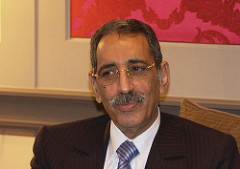Ely Ould Mohamed Vall facts for kids
Quick facts for kids
Ely Ould Mohamed Vall
إعلي ولد محمد فال |
|
|---|---|
 |
|
| Chairman of the Military Council for Justice and Democracy | |
| In office 3 August 2005 – 19 April 2007 |
|
| Preceded by | Maaouya Ould Taya |
| Succeeded by | Sidi Ould Cheikh Abdallahi |
| Personal details | |
| Born | 1953 Nouakchott, Colonial Mauritania |
| Died | 5 May 2017 (aged 63–64) Zouérat, Tiris Zemmour Region, Mauritania |
| Spouse | Um Kalthoum Emt Annah |
Ely Ould Mohamed Vall (born in 1953, died in 2017) was an important military and political leader in Mauritania. In August 2005, he became the temporary military leader of Mauritania after a military takeover. He held this position until April 2007, when he handed power over to a new government chosen by the people.
Contents
Early Life and Military Career
Becoming a Leader in Mauritania
Ely Ould Mohamed Vall was born in Nouakchott, Mauritania, in 1953. He was a close friend and supporter of President Maaouya Ould Taya. In December 1984, Vall helped Ould Taya come to power in a military takeover. Before the 2005 events, Vall was in charge of Mauritania's national police force, called the Sûreté Nationale, starting in 1987.
Leading the Country After 2005
The 2005 Military Takeover
On August 3, 2005, President Ould Taya was out of the country. A group of military officers took control of Mauritania without any fighting. They formed a group called the Military Council for Justice and Democracy. They announced that Ely Ould Mohamed Vall would lead this council. Vall chose not to call himself "President" because he believed that title should only be for leaders chosen by the people.
Promises for a New Government
The new military leaders said that Ould Taya's government was unfair. They promised to hold elections and return the country to civilian rule within two years. They planned to have a vote on a new constitution within one year. After that, elections for parliament and president would follow. Vall and the other military leaders agreed that they would not run for president themselves.
International Reaction to the Coup
Many people in Mauritania welcomed the change. However, countries outside Mauritania strongly criticized the takeover. The African Union stopped Mauritania's membership. The European Union, United Nations Secretary General Kofi Annan, and the United States all spoke out against the coup. But after a few days, this opposition became weaker, and it seemed the new leaders gained quiet acceptance from other countries.
Mauritania's Relationship with Israel
Vall kept Mauritania's diplomatic ties with Israel. Mauritania and Israel had started full diplomatic relations in 1999 under President Taya. This decision had made Taya unpopular with some people. After the 2005 takeover, Ahmed Ould Sid'Ahmed, who had been the Foreign Minister when relations with Israel began, was given his job back.
Moving Towards Democracy
New Constitution and Elections
A vote on a new constitution took place on June 25, 2006. About 97% of voters approved it. This new constitution limited presidents to two five-year terms. Under Taya, presidents could serve six-year terms with no limit on how many times they could be re-elected. The new constitution also required a president to promise not to change these term limits. Vall traveled around the country to encourage people to vote for it, calling it a "historical opportunity."
Free Elections and Handover of Power
Parliamentary and local elections were held on November 19, 2006. Vall praised these elections, saying it was "the first time Mauritanians have been able to express themselves freely." He also believed that the difficulty of changing the constitution would help protect democracy in the future. Vall announced that he would step down after the presidential election in March 2007.
Sidi Ould Cheikh Abdallahi won the presidential election. Some of his opponents claimed that Vall's government supported Abdallahi. Before the power was handed over, Mauritania was allowed back into the African Union on April 10. On April 19, Abdallahi officially became president, completing the move back to civilian democratic rule.
Later Political Life
The 2008 Coup and Vall's Candidacy
In August 2008, the military, led by General Mohamed Ould Abdel Aziz, took power again. They removed President Abdallahi from office. A new presidential election was planned. On June 6, 2009, Vall announced that he would run as an independent candidate. He criticized the 2008 coup, saying it was "wrong and there was no reason for it." He felt it had created a "particularly dangerous situation" for Mauritania.
Vall explained that his goal, if elected, was to "build a reconciled country that is politically and economically viable and stable." He also said he would "probably no longer be interested in public affairs" if the 2008 coup had not happened.
Election Results and Continued Opposition
The election was held on July 18, 2009. Official results showed that Vall did not get many votes, while Abdel Aziz won a majority in the first round. At a press conference on July 30, Vall stated that the election was just a way to make the 2008 coup seem right. He believed it had brought the country back to the unfair rule it had under President Taya. Vall said he would continue to fight against Abdel Aziz's government.
Other Activities and Death
Supporting Democracy and Peace
Vall was a board member of the Arab Democracy Foundation, an organization that promotes democracy. He was also part of the honor committee for the Fondation Chirac. This foundation was started in 2008 by former French president Jacques Chirac to promote world peace.
Ely Ould Mohamed Vall died from a heart attack on May 5, 2017, in Zouérat, Mauritania.
See also
 In Spanish: Ely Ould Mohamed Vall para niños
In Spanish: Ely Ould Mohamed Vall para niños

